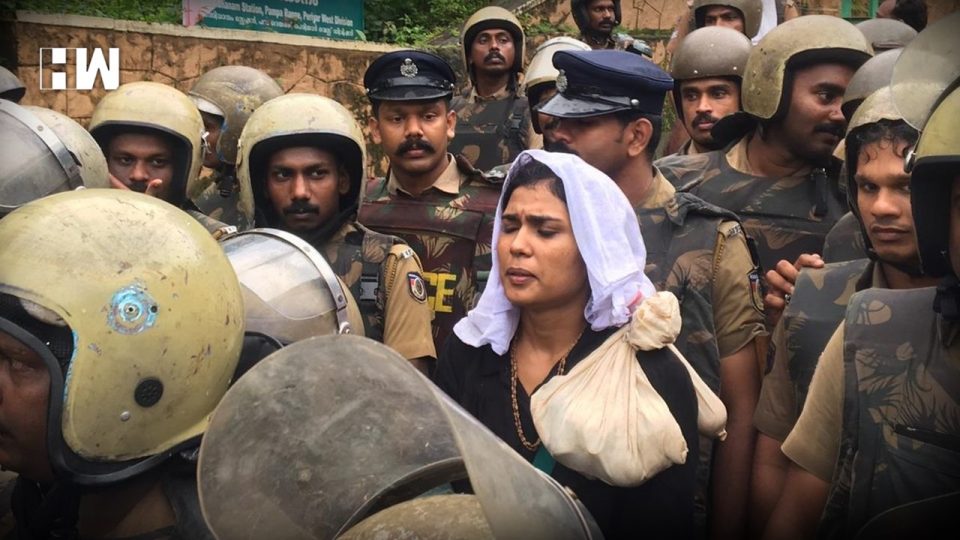What the Sabarimala stand-off then leaves us with? Should the judiciary keep off from matters of faith?
Martin Luther a seminal figure in the Protestant Reformation who defied the practices of the Roman Catholic church had once said, “Reason is the greatest enemy that faith has: it never comes to the aid of spiritual things.” I recall this statement at a time when the Sabarimala row has gripped the nation in a not-so-unfamiliar frenzy.
The Sabarimala stand-off today entered the third day. Since the five-judge constitution bench of Supreme Court on September 28 lifted the ban on entry of women of menstruating age in Kerala’s Sabarimala temple, the state has been stricken with a widespread protest. The Supreme Court in its 4:1 verdict said, “Right to worship is given to all devotees and there can be no discrimination on the basis of gender.” The bench further added that “The practice of barring women in age group of 10-50 to go inside the temple is violative of constitutional principles.” The sole woman judge on the bench, justice Indu Malhotra, however, disagreed with the majority judgement and pointed out that judiciary mustn’t interfere in matters of faith. She also noted that diversity must not be misunderstood with discrimination. “It is not for the courts to determine which of these practices of a faith are to be struck down, except if they are pernicious, oppressive, or a social evil, like Sati,” her opinion said.

Well, as the majority judgement prevailed, the prohibition on women’s entry in Sabarimala was diluted. As expected, while a section of society accepted and welcomed the judgement, a majority of the people rallied behind the age-old tradition restricting women between age 10-50 from visiting the celibate deity of Ayyapa. When the gates of the Sabarimala temple were opened for the first time after the judgement on Wednesday, everyone waited with bated breath for a confrontation between the protestors and women devotees who wanted to go to Sabarimala. However, what happened on the ground was more than confrontation. The violent protest, heckling of women journalists and attacks on many others who were trying to enter Sabarimala turned the holy site in a war-like zone.
The women vigilantes from the hundreds of protestors that turned up at the base camp at Nilakkal apparently, stopped each vehicle en route Sabarimala and checked whether a menstruating woman was in it or not. Several women journalists of prominent news channels were attacked by the protestors. There is no justification for the violence in the name of protest and defending a ritual. It has to be condemned through and through.
What also should be condemned in the same breath is hurting the sentiments of Ayyappa faithful in the name of defiance. On the third day, two women attempted to enter the temple amid tight police protection. 24-year-old Kavitha Jakkala, a Hyderabad based news anchor and another woman, identified as Rehana Fathima from Ernakulam, were heading towards the sanctum sanctorum of the Sabarimala temple when they were stopped midway. The women were asked to head back after it was found that they were activists.
The incident is enough to fathom how the Supreme Court verdict opened the floodgates for it to be misused. In an editorial dated October 1, the managing editor of HW News, Mr Sujith Nair had expressed a strong possibility that some women might turn up at Sabarimala as an act of defiance rather than out of sheer devotion for Lord Ayyappa. Now, the question here is how do we decided who are devotees and who are not? Furthermore, who will decide it?
As a matter of fact, devotion is a personal choice. Devotion comes when there is faith and sometimes faith goes beyond logic and reasoning. The rituals followed by the faithful thus, are a part of devotion. The #ReadyToWait campaign against the PIL filed in the Supreme Court was started by women faithful of the Lord Ayyappa deity and derails the entire argument that women of certain age-group not entering Sabarimala is a result of patriarchal rituals and traditions. The women who entered Sabarimala today, as they even admitted were not devotees. Then why should the brazen defiance and mocking of the devotion be acceptable?
What the Sabarimala stand-off then leaves us with? The judiciary should keep off from matters of faith? Or the judgement is a result of constitutional equality to women? Or the fact that the verdict has indeed opened floodgates which will lead to the display of superfluous defiance laughing at the devotion?
As an independent media platform, we do not take advertisements from governments and corporate houses. It is you, our readers, who have supported us on our journey to do honest and unbiased journalism. Please contribute, so that we can continue to do the same in future.


